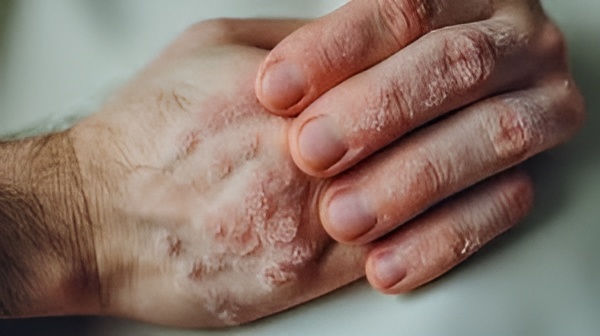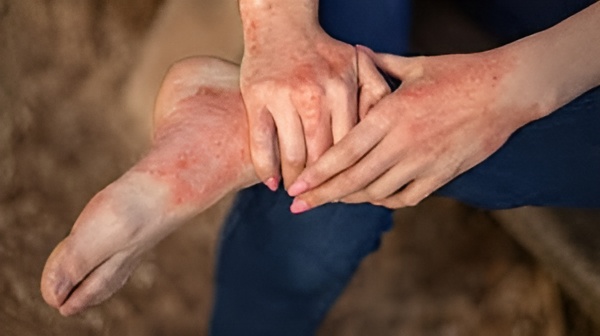

Dermatitis covers various skin inflammations like eczema, contact dermatitis, and seborrheic dermatitis. These can be caused by allergens such as pollen or certain foods, irritants like harsh soaps, infections, and stress. Symptoms vary from mild redness and itching to more severe blistering. Treatment includes finding and avoiding triggers, using gentle skincare products and moisturizers. Sometimes, medical advice or alternative treatments like homeopathy can help manage it effectively for individual needs. It's important to understand your skin's reactions and seek the right care to keep it healthy and comfortable.

Dermatitis refers to inflammation of the skin and can arise from various factors. The exact cause often depends on the type of dermatitis, but in general, it develops when the skin reacts to irritants, allergens, or internal immune responses.
Genetic Factors:A family history of eczema, asthma, or hay fever may increase the risk of developing certain forms of dermatitis, such as atopic dermatitis.
Allergens:Exposure to allergens like pollen, dust mites, pet dander, or certain foods can trigger immune responses that lead to flare-ups.
Irritants:Contact with soaps, detergents, cosmetics, fragrances, and harsh chemicals often causes irritation, leading to contact dermatitis.
Environmental Factors:Changes in weather, extreme heat or cold, and low humidity can dry out the skin and worsen dermatitis symptoms.
Stress:Emotional stress can weaken the skin’s natural barrier and act as a trigger for flare-ups or worsening of existing symptoms.
Immune System Dysfunction:In some cases, the immune system becomes overactive and mistakenly attacks healthy skin, contributing to chronic inflammation.
Dermatitis affects the skin in different ways depending on its type and severity. While the symptoms may vary from person to person, they generally involve irritation, inflammation, and discomfort.
Redness and Inflammation:The skin often appears red, swollen, or irritated, which can worsen with scratching or exposure to triggers.
Itching:Persistent itching is one of the most common symptoms of dermatitis and can range from mild to severe, sometimes interfering with sleep or daily life.
Dry and Scaly Skin:Affected areas may become rough, flaky, or develop scaly patches, especially when the skin barrier is compromised.
Blisters or Oozing:In some cases, dermatitis can lead to small blisters that may ooze fluid before crusting over.
Thickened Skin:Chronic scratching or rubbing of affected areas can cause the skin to become thick, leathery, or darker in color over time.
Location of Symptoms:Dermatitis often appears on the hands, face, neck, inside of the elbows, behind the knees, or other areas exposed to irritants or allergens.

Homoeopathy aims to manage and alleviate the symptoms of dermatitis effectively. While it may not offer a guaranteed cure for every case, many people experience significant improvement in their condition with consistent treatment and proper management.
The time to see improvements can vary depending on the individual's condition, the severity of dermatitis, and how well they respond to homeopathic remedies. Some people may notice improvements within a few weeks, while others may require several months of treatment for noticeable changes.
Yes, homeopathic remedies are generally safe for children with dermatitis. They are gentle and natural, making them suitable for children and adults alike. However, it's essential to consult with a qualified homeopathic practitioner for proper guidance and dosage recommendations tailored to the child's age and condition.
Homeopathy can be beneficial in addressing severe dermatitis symptoms such as itching, inflammation, redness, and discomfort. Homeopathic remedies are selected based on the specific symptoms and characteristics of the individual's dermatitis, aiming to provide relief and promote overall skin health.
Lifestyle changes that can complement homeopathy in managing dermatitis include maintaining good skin hygiene, avoiding triggers such as harsh soaps or allergens, managing stress levels, staying hydrated, eating a balanced diet rich in nutrients, and following a skincare routine recommended by your homeopathic practitioner. These lifestyle adjustments can support the effectiveness of homeopathic treatment in managing dermatitis symptoms and promoting skin wellness.
Connect with our skilled homeopathic practitioners today and embark on a journey towards healthier, happier skin with homeopathy!